Chris Baty's Blog, page 220
January 22, 2013
Ari Asercion: Brainstorming Harmonious Living with Your Inner Editor

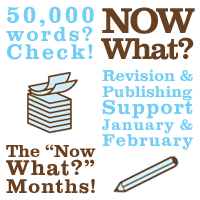 Ari Asercion, a longtime Wrimo and a fantastic intern at HQ for the past two NaNoWriMo sessions, checks in with a pep talk about how to deal when your inner editor stops being polite, and starts getting real. Need more pep as you edit? Rachael Herron’s talk is here, and you can see who’s in the pipeline on the Introducing the “Now What?” Months page.
Ari Asercion, a longtime Wrimo and a fantastic intern at HQ for the past two NaNoWriMo sessions, checks in with a pep talk about how to deal when your inner editor stops being polite, and starts getting real. Need more pep as you edit? Rachael Herron’s talk is here, and you can see who’s in the pipeline on the Introducing the “Now What?” Months page.
Dear Writers,
A pep talk on revision! After doing three rounds of NaNoWriMo where I would continually fall off between 15,000 and 30,000 words, I was able to validate my first complete NaNo-novel this past November. Writing a novel from scratch (or from the Post-It notes stuck to your desk) is something I only recently learned how to do. But revision, yes, that is something I can speak to.
Remember that inner editor you stifled sometime around late October? Well, she’s back. And when you let out your inner editor, it can feel like setting the dogs on your own writing. You look at what you’ve written, the work you were so proud of, the characters you’ve coddled, the plot points that got you excited about writing in the first place, and suddenly… everything seems awful.
“Everything?” your inner writer asks.
“Yes, everything,” your inner editor says, with a sweep of her red pen.
Your writer sticks her fingers in her ears and goes, “La la la.” She wants to curl up into a ball of shame until November.
Relax! This is all perfectly normal. This is what happens when you send your editor away on an extended vacation so you can write with the utmost freedom and abandon. She comes back all scowly, because she’s been left out. The truth is, your editor is good, and she wants to collaborate. She just has a strong personality. Your writer is good, too, and wants to improve. She’s just a little sensitive sometimes.
When it comes to revising your novel, it’s time for your inner writer and inner editor to make friends, or at least become good roommates. They don’t have to always agree (and, in fact, they won’t), but they have to understand the importance of each others’ roles, and brainstorm ways to work together harmoniously.
Here is one way: I had a teacher once tell me that revision is recursive. That means it’s spiral-shaped, like a Slinky. You edit some, go back and read it, edit some more, continue reading onward, go back and cut out a character, keep reading. It’s shaping your story into the story that you actually intend it to be, just a little at a time—chapter by chapter and paragraph by paragraph.
My teacher also compared the process to carving a statue: chipping away at the edges, slowly seeing the outline emerge from that block of marble. And that’s a nice thought. But for me, there’s very little difference between the two. Revision, in its own way, has always just felt a lot like writing.
And we all know us Wrimos know how to do that.
 Ari Asercion is an abiding NaNoWriMo intern and habitual editor.
Ari Asercion is an abiding NaNoWriMo intern and habitual editor.
January 17, 2013
On Mining Good Beta Readers

 James Scott Bell joins us today for the “Now What?” months, during which we edit, revise and seek to publish our NaNo-novels! The bestselling writing coach and author tell us about how to find and treasure great beta readers:
James Scott Bell joins us today for the “Now What?” months, during which we edit, revise and seek to publish our NaNo-novels! The bestselling writing coach and author tell us about how to find and treasure great beta readers:
Good beta readers are gold. You must dig for them, and take care of them once they are found. A good beta reader will be someone who gives you specific feedback on your novel. You want to ask them for an overview the length of at least half a page, and then for any specific things that jump out at them.
What is well-intentioned but can be less helpful is: “I loved this! Can’t wait to see it published. Let me know when it is!” To find beta readers, make up a list of all the people you know who might be able to offer you this feedback. Where do you find such people?
First of all, in your own circle. Another way is to attend a really good writer’s conference, and make sure that you network with other writers there. [ED NOTE: Or, of course, you can always search out fellow writers who would be great readers for you on the NaNoWriMo forums!]
Then email the list via blind copies asking if they would be interested in being pre-readers for your novel. Tell them that you would like to list them in the acknowledgements. Give them a preferred turnaround time (e.g., a month).
Send out your manuscript.
Get back the replies.
Go through the replies, and thank each person by email or a mailed note.
Pinpoint the most useful responses and ask those beta readers if they would be willing to read future drafts. You can mentally label these your “gold list”.
The next time you need a reader, get in touch with those folks, and perhaps add a few new names to the batch.
Make a master document of all the suggestions and go through them, making changes in your manuscript (or not… the final decision is yours).
I will say, here, that learning your craft should be an ongoing process. Don’t ever stop. Does a brain surgeon stop reading medical journals or going to conferences? If he did, would you want him poking around in your gray matter? Be the same way. Make learning a passion. Here’s a word from the New Year: your work is just beginning.
It’s a good word. Because you’re going to take what you have and make it better. That’s the very cool thing about revision. You let your wild writer’s mind go free in November. Now you settle it down with a dose of reality and an editor’s hat.
You assess. You think. You analyze. You edit. And then, after you edit, you turn it over to others to get feedback.
Now what do you have?
A better book than what you had at the end of November. Guaranteed.
Now get to work on the next one.
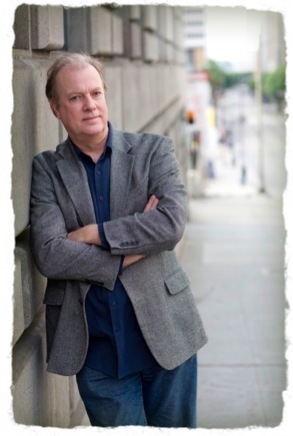 James Scott Bell is a bestselling writing coach, author of Plot & Structure, Revision & Self-Editing for Publication, The Art of War for Writers, Conflict & Suspense and Writing Fiction for All You’re Worth. He is also a bestselling thriller writer and former fiction columnist for Writer’s Digest magazine.
James Scott Bell is a bestselling writing coach, author of Plot & Structure, Revision & Self-Editing for Publication, The Art of War for Writers, Conflict & Suspense and Writing Fiction for All You’re Worth. He is also a bestselling thriller writer and former fiction columnist for Writer’s Digest magazine.
Author photo courtesy of jamesscottbell.com. Top photo by Flickr user kryptonic83.
January 15, 2013
In Your Words: Revision Advice from Young Writers
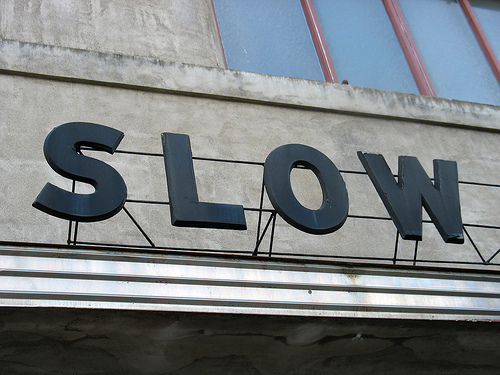
 As the “Now What?” months storm ahead, we asked the thousands of kids, teens, and teachers who write with the Young Writers Program for their best revision advice.
As the “Now What?” months storm ahead, we asked the thousands of kids, teens, and teachers who write with the Young Writers Program for their best revision advice.
Here are a few things they told us.
On Getting Started:
“Don’t charge at it with open pens, take it slowly, chapter by chapter.” — Sockrocks
“Sometimes, getting the motivation to edit can be hard. Yes, it can feel tedious. And yes, it can feel worthless. But it’s not. You want everyone to see you as the best writer you can be!” — golden retriever
“Make it fun, take it slow, enjoy the process. Pretend it’s a game, a challenge, a treasure hunt.” — Silversparrow
On Just How, Exactly, to Edit:
“Work on it a little each day. Look critically at each sentence and ask yourself, ‘Is this exactly what I want to say?’ and ‘Is there any way I could make this better?’” —phantom10
“Read your novel. Analyze your plot.
Change stuff.
Read it again.
Change stuff.
Give it to a friend to read. Get feedback.
Change stuff.
Repeat.” — Kristen Elizabeth
“Don’t be afraid to cut things out, or to rewrite whole chapters! And definitely give it to someone else to read after you’ve gone through it. Their advice will help you improve your story. You don’t have to listen to everything they say—you alone are the ruler of your novel’s world—but it can be useful to get another perspective.” — amcgrath
“While copyediting, the best thing to do is to not look at the book as a whole. Instead, read each sentence apart from the book. Doing this, you will find sneaky spelling and grammar errors.” — Insane Author
“If a scene is so bad that even rewriting can’t fix it, delete it, but keep a copy. You never know when old ideas can be recycled!” — Sammy7300
On How to Fight the Editing Blues:
“My advice is that you shouldn’t think too much about how bad it is. Think about how you can make it better, and make notes for next time. You can’t go through your writing life thinking about how terrible you are, when you really have a wonderful gift and passion.” — myrachippymom
“Remember that just like how the first draft isn’t your final piece, most of the time your second isn’t either. You don’t need to fix everything all at once.” — Shimmer 583
“Don’t forget that ‘perfect is the enemy of good.’ Work on your novel until it’s good, but remember that it will never be perfect. Play with your words and exchange your sentences and change your novel until you sit back and can’t think of anything else to do to it. That’s when you know you’re done.” – President Fantasy
On the Rock-Star Company You Keep:
“Remember: you are not the only one struggling to revise your novel. You are not the only wondering why editing seems harder than writing. Why? Because we all are.” — jane99
What are your favorite editing tips or bits of wisdom?
Photo by Flickr user frankfarm
January 11, 2013
NaNoWriMo: The Epilogue

 We’ve launched the “Now What?” months in January and February to focus on editing, revision, and publishing! Today, Adam Wilson, an editor at Gallery and Pocket Books, shares his five steps for perfecting your NaNo-novel. For more about the authors, agents, and editors on deck, check out our Introducing the “Now What?” Months page.
We’ve launched the “Now What?” months in January and February to focus on editing, revision, and publishing! Today, Adam Wilson, an editor at Gallery and Pocket Books, shares his five steps for perfecting your NaNo-novel. For more about the authors, agents, and editors on deck, check out our Introducing the “Now What?” Months page.
Hello writer-marathoners! Recently, I saw someone joking that now that NaNoWriMo has drawn to a close, perhaps NaNoEdMo is on the horizon. Or even possibly NaNoSubmitYourBookYo is what’s next. (Copyeditor’s note: We like to think the “Now What?” Months are a little catchier!)
For some of you, yes, you’ve been plugging away at your keyboard with an eye toward launching a writing career and, clearly, super-fame. Some of you just wanted to see if this whole American Novel thing could be done by a mere mortal. And yet more of you are still buzzing so hard on caffeine that you should probably just wait a bit, take a nap, and read this later. I, however, was given a deadline. So, ready or not, here are my 5 Things I Think All NaNoWriMo Conquerors Should Know/Do/Whatever.
1. Give yourself a pat on the back
You did what this month—a book? Seriously? Whoa. I’ve known a lot of writers, and I wouldn’t wish that workout on anyone. Think about it—in the history of the world, less than .01% of people even try to write a book. Did I just make that up? Yes. But if feels right, yes it does. And I’m just going to double-down and say that the percentage of people who have actually completed a book is even lower. (A copyeditor will catch my math mistake if I’m wrong. Oh, and that’s a good bit of advice for down the road: copyeditors.)
But, really, you should be very proud of what you’ve accomplished. When’s the last time you said fifty- or sixty- or seventy-thousand words about anything, let alone a coherent narrative with characters and worlds and intrigue and things you just made up out of your own slushy brain matter? At parties, you will be able to honestly answer the question, “Hey, have you ever written a book?” with the not-lie “Why, yes. Yes I have.” So take a moment and think about the audacious thing you’ve done. A novel of one’s own. Crazy. Congrats! Having done this is something you will never forget, and something nobody can ever take away from you.
2. Take a break after your first draft
Okay, after the adrenalized whirlwind of November, this is going to be my most difficult-to-follow piece of advice. Most of you will have ignored it. You might think “that’s so twentieth-century and non-smartphone.” But, really, truly, you need to have taken a break from what you’ve written. Let it breathe like a fine wine, or a bad wine. One will get better with oxygenation; the other won’t be in any worse shape than it already is.
3. Read something outside of your beloved genre
Since you’re clearly following my advice and not obsessively counting adverbs and wondering about comma-placement in The Creation right now, how about you read something? And how about you don’t read the same genre you always do, the one that you just finished contributing to. Reading the same genre is very likely to make you want to rework The Creation to be exactly like whatever published book you pick up—because Published equals Success, right?—and what’s the point in that?
If you’re a hard sci-fi writer, go for some David Foster Wallace, or that memoir about that one woman who did that one amazing thing. If you’re wearing your “Jonathan Lethem is #1” T-shirt right now, try some sweet romance, or erotica, or even a bunch of technical journals. Seriously, you never know where your next great idea is going to come from, or what’s going to make you go, “Hmmm.” And the whole genre- or literary-snobbishness thing? So pointless. You won’t lose anything for having tried. You won’t be dumber; you won’t be more elitist. The other ‘type’ of book you don’t normally read won’t ‘win’ or something foolish. Which leads to…
4. Writing is not a zero-sum game
Okay, there are a million people with a million strategies for how to achieve bestseller-dom. Some people are making a lot of money the old-fashioned way, and others go the e-fashioned way. And there’s always someone portending doom or crying foul about whatever platform or business strategy they happen to have just read an article about online. There are always people ready to question the legitimacy of something someone else has written. I’m not here to try to convince you of any particular strategy or argument. What I am here to do is say one thing: The writer next to you is not your enemy. (At least not for this. If one of them offs your ant collection, that is not a nice person. Do not talk to them.)
Yeah, I know. It feels bad when someone whose work you don’t personally value gets all the attention. We’d all like the world to play to our preferences, but I’m pretty sure that it’s not going to. I’m not sure anyone’s ever gotten 100% of what they wanted. (Copyeditor?) (CE: Confirmed via office poll. Science!)
The point is: your fellow writers aren’t your enemies, or even necessarily your competitors. Just because Writer A gets a book contract, it does not mean that Writer B is losing out on one. Just because Self-Pubber A has a ton of success with their e-novel, it doesn’t follow that Self-Pubber B is forever screwed. The market is fickle, cannot ultimately be predicted, and rotates her favors all the time.
But you know what that means? It means your turn might be next. No one style or writer ever dominates completely—ever. Sure, series like Fifty Shades or Harry Potter come along and get a lot of attention, but other books are being sold and read and appreciated at the same time as those. One book’s success is not damning for the next. Likewise with writers.
5. Passage Relocation Program
You’ve all heard “Kill your darlings,” and I guarantee you’ll have some really, really cheesy things come out of that fountain pen o’ yours. Things you’ll looooooooove. (Hello Adam, make sure you never forget Poem #28 to your secret high school crush, “I.X.R. B.N.T.”) So yeah, some things will clearly have to go.
However, I’ve always hated this “darlings” phrase—because however will you know when you’ve done something that you both love and is actually really worthwhile for the story? I guarantee you that Shakespeare didn’t kill all his darlings. In truth, you really should like some of the stuff that you come up with. That’s partly how you discover your writerly voice. It’s partly how you separate the wheat from the chaff.
For my money (i.e. time), I think that the best thing to do when reviewing any element in a book is to change the evaluation question from “Is this one of those ‘darlings’ I’m supposed to fear and gather the pitchforks for?” to “Does this element belong here?” See how less cable-news-talking-head the question becomes? Changing the approach changes the result.
As an editor, I’ve been faced with books that come in at 90,000 words and need to get down to 60,000 or so for various reasons. And sometimes even the 30,000 words you have to cut were good ones. However, just because you cut something out of this book doesn’t mean that you can’t use it later in another piece.
The two best methods, IMHO, for determining if something belongs in a specific work are:
Reading your work again and again and again and again so you’re desensitized to it, and can learn what works and what doesn’t. (Doing this over time is much, much better, and less madness-inducing.)
Getting someone else to read The Creation. Yes, this means sharing what you’ve done. There is simply no better way to see how your book’s operating than for someone else to tell you how they are experiencing it.
Now what this means is that you will write more than you use. But so what? If it’s that good, you’ll find a use for it down the line. (And no, I don’t mean just publishing everything you’ve ever done online—if you want people to pay attention to you as a writer, you have to respect their time as a reader in equal measure.)
Lastly, if rhetoric allowed me to have six tidbits instead of five, Point #6 would be this: laugh and have fun with all of this. Writing is a terribly tough, amorphous task. If you don’t laugh as you enact your journey, you’ll laugh at the end of it, all alone somewhere deep, deep inside of a padded room.
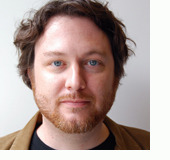 Adam Wilson joined Gallery and Pocket in 2011 as an editor, having previously worked at MIRA and Harlequin Teen. Raised in Colorado, he defected to Seattle, but somehow ended up in New York, where he reads for a living and places foremost importance on authorial voice. He recently acquired Lynn Viehl’s Disenchanted & Co. series for Pocket Star—her Creation from a NaNoWriMo excursion a few years back. Follow him online @AdamDetritus and check out the Pocket After Dark community site. (Sorry, agented queries only.)
Adam Wilson joined Gallery and Pocket in 2011 as an editor, having previously worked at MIRA and Harlequin Teen. Raised in Colorado, he defected to Seattle, but somehow ended up in New York, where he reads for a living and places foremost importance on authorial voice. He recently acquired Lynn Viehl’s Disenchanted & Co. series for Pocket Star—her Creation from a NaNoWriMo excursion a few years back. Follow him online @AdamDetritus and check out the Pocket After Dark community site. (Sorry, agented queries only.)
Headshot courtesy of Gallery Books. Top photo courtesy of Flickr user dtelegraph.
January 9, 2013
Rachael Herron: Revision & Slipping Back Into Your World

We’re launching the very first pep talk of our “Now What?” months, focusing on editing, revision, and publishing, with Rachael Herron, a long-time Wrimo, and six-time published author. For more about the authors, agents, and editors participating, check out our Introducing the “Now What?” Months page.
Dear Novelist,
I just wrote a whole post about revision. It was good. It had bullet points! It was designed to get you excited and geared up for revising your novel!
Then after working on it for a while, I realized it wasn’t what I wanted. So I threw it out. Ah, revision.
There’s this fear, isn’t there? Around revision? I don’t know where it comes from (oh, maybe it’s from the person who sees you holding your hundreds of pages, hands you a hammer, and says, “Hey, real quick, build a house from this scrap heap, okay?”) but it’s insidious and prevalent in the writing community.
It’s also wrong. Revision is, hands down, the best, most fun, most creative part of writing. (And this is from a person who was just like you—I dreaded the very thought of it. I knew I couldn’t do it. I also knew people who liked revising were sick and deluded, and I would never be one of them.)
How time throws your own words back in your face, huh? First drafts are now agony for me. Every day! Having to figure out what happens next. So exhausting! Revision, on the other hand, means slipping into your world—the place you built, the place only you know—and looking around. Hey, I need that couch over there. Oh, I think this whole room could be painted. Or, heck, I don’t need this room at all. I’m going to convert it into a helipad. Yeah!
If you want more of my (specific) ideas on revision, go here. But for now, just rest in this: everyone (everyone!) hates the idea of revision until they figure out how it works for them. You’ll figure it out. And then I bet you an ice cream cone that you’ll agree with me.
It’s better over here in revision land. Come visit. It’s the most fun you can have in writing. Promise.
Rachael Herron
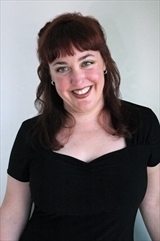 Rachael Herron completed her first novel during NaNoWriMo 2006. She has gone on to sell it (and five more books) to HarperCollins, Chronicle Books, and Random House Australia, and she is still stunned she can add the words “award-winning” and “international bestseller” to her bio. She lives in Oakland with her wife, seven embarrassing animals, and a lot of yarn. You can find her at her website and on Twitter.
Rachael Herron completed her first novel during NaNoWriMo 2006. She has gone on to sell it (and five more books) to HarperCollins, Chronicle Books, and Random House Australia, and she is still stunned she can add the words “award-winning” and “international bestseller” to her bio. She lives in Oakland with her wife, seven embarrassing animals, and a lot of yarn. You can find her at her website and on Twitter.
Author photo by Khalil Robinson.
Top image by Flickr user Jeni Rodger.
January 7, 2013
Reveling with Your Inner Editor on the Revision Playground

Happy new year! We’re back to NaNo HQ feeling rejuvenated, and incredibly excited for 2013. Why so stoked? We’re launching our first ever “Now What?” months in January and February. We’ll be providing articles and pep talks about the sometimes-intimidating process of editing, of revision, and of publishing, in the company of editors, agents, and authors like Hugh Howey and Marissa Mayer.
Our very own Grant Faulkner kicks off the month by freeing his inner editor from its confines. Are you revising your NaNo-novel this year?
I’m going on the record with a controversial statement: Your inner editor, despite his or her persnickety reputation, can be fun.
Now I know that we in NaNoLand advise writers to banish their inner editors during NaNoWriMo. No one wants to hear some crank screaming “No!” in the background or get dressed down for a plot hole during the rush of writing a first draft. But with a first draft in hand, you’ve now built a playground for your inner editor to frolic in. Yes, frolic.
I recently opened the door to the dark mental dungeon where my inner editor has been locked up, and it turns out he’s got a nice smile (despite being a little pale). Examining the arc of my novel is like going down a twisting, double-dipper slide for him, and he loves brainstorming stirring details to add to my story’s cauldron. He also possesses a rather refined eye for sentences written in the passive voice, and he likes prodding me to write with “vivid verbs” and to “show don’t tell.”
So I’m primed to rewrite my swirling, chaotic mess of a NaNo novel and see if I can shape it into something readable, if not outright good. “Writing is rewriting,” as the old adage goes, and although revision has a reputation for being daunting and full of drudgery, it also holds the deep satisfaction of shaping the textures and contours of one’s ideas. It’s just a different kind of play than writing a first draft.
Revising with a Plan
That said, I’ve suffered through flawed approaches to past novel revisions. I tend to just start rewriting from the beginning: reading and reworking the first chapters ad nauseum, so much so that I end up essentially neglecting the final two-thirds of the novel. Because I haven’t devised a true game plan, I don’t make the daring and often necessary moves of restructuring the plot or “killing my darlings,” as William Faulkner advised (one of the best revision tips out there).
I end up with essentially the same novel, only with a new coat of paint on the front porch, continuing to fail to see that there’s a huge hole in the roof.
To escape my revision rut this time around, I’m taking some tips from The Artful Edit: On the Practice of Editing Yourself , by Susan Bell. Bell, a former Random House fiction editor, believes that writers can overcome the “panicky flailing” that revision can induce by learning “to calibrate editing’s singular blend of mechanics and magic.” She weaves in self-editing advice from the likes of Michael Ondaatje, Tracy Kidder, and Anne Patchett, and provides a wonderful running case study of the editorial collaboration between F. Scott Fitzgerald and his editor Max Perkins.
, by Susan Bell. Bell, a former Random House fiction editor, believes that writers can overcome the “panicky flailing” that revision can induce by learning “to calibrate editing’s singular blend of mechanics and magic.” She weaves in self-editing advice from the likes of Michael Ondaatje, Tracy Kidder, and Anne Patchett, and provides a wonderful running case study of the editorial collaboration between F. Scott Fitzgerald and his editor Max Perkins.
The book opens with a quote by Walter Murch that sums up her approach: “We’re grafting these branches onto a tree that already had an organic, balanced structure. Knowing that we’re changing the organism, we’re trying not to do anything toxic to it, and to keep everything in some kind of balance. At this point, I don’t know what the result will be. I have some intuitions, but my mind is completely open.”
While keeping my mind open—perhaps the key way to make revision fun and creative—here’s an outline of my approach:
Set a deadline: Revision can be another word for procrastination. I have a novel I wrote 9 years ago that I’ve puttered through several times, and it still lacks a decent ending. Just as a deadline is important in churning out a first draft, it’s crucial for the second draft. I’m giving myself 6 months to revise this year’s NaNo-novel. Check in with me on July 1, 2013 and hold me to my words.
Gain distance: “The greater the distance,” writes W.G. Sebald in The Rings of Saturn, “the clearer the view: one sees the tiniest details with the utmost clarity.” Time is the best way to distance yourself from your novel and read it as another might. The key is to take enough time away from your first draft so that you can read it with fresh eyes, but not to take too much time so that you lose your momentum. Everyone is different, but December distanced me plenty from my novel.
Beyond the distance of time, I’ve printed out my novel in a different font so that it won’t look like the novel on my computer screen when I read it. I also plan to read it somewhere else than at home because reading in a café or library will provide an extra layer of remove.
Read first with a macro edit: Bell discusses two types of editing: 1) the macro view, editing with a larger view toward the rhythms and connections of structures and themes; and 2) the micro view, editing with attention to such things as images, word choice, and sentence structure.
In my first pass, I’m not going to noodle with sentences. I want to focus on the big picture and evaluate the patterns of my novel, its leitmotifs and plot points. Then I’ll read the novel again—much more slowly—and hone in on the specifics.
Change my writing mode: Since I banged out my NaNo novel on a keyboard with such desperate speed, I want to slow down for the second draft and ruminate on my story, so I plan to write new sections longhand. Writing with a pen and paper changes writing in mysterious ways because it brings on more pauses and leads to fewer of the Facebook distractions that plague me on my computer.
Revise non-chronologically: Who says you have to revise from beginning to end? I specialize in novels with strong beginnings, weak middles, and weaker endings. Maybe I’ll start with the ending this time around and hop around to sections that need the most strengthening.
Find beta readers: I don’t want anyone to read my first draft; it’s just too messy for another to critique. But after a solid second draft, I’ll crave feedback. Finding readers is tough, though. I’ve made a list of friends who read in the genre I’m writing in, and they know how to deliver feedback without raining on my parade (I hope). My wife is a great reader, but I find that novel critiques and a happy household don’t usually go hand-in-hand.
Fortify myself with resilience magic: Revision can be a battlefield of self-doubt and torture, where writing turns into a swamp of masochism rather than a font of creativity. I’ve done enough revision to know that I’ll have a day or a week or a month when I lose faith in my work, if not my entire worth as a human being.
I’m steeling myself for such moments. As much as I believe in the urgent necessity of letting loose the pure flow of creativity, I also believe in the powers of resilience, the necessity to just keep plodding. Most things are accomplished not in grand gushing sweeps, but through daily incremental resolve.
It’s that resolve that matters most in revision, and I don’t think any “how to” book can give you that. But if you participated in NaNo, you have it. You had the fortitude to accomplish the audacious task of writing a novel in just a month. Revision might even be easier because you already have a story to work with, and hopefully a constructive inner editor to play with.
If you’re ready to revise one of your NaNo novels, please tell me your next steps. I’m constantly refining my approach, so I’d love to hear your thoughts.
— Grant Faulkner
Image by Flickr user ajari.
December 21, 2012
Saying Goodbye to 2012, Looking Ahead to Writing in 2013

We here at NaNoWriMo HQ are heading into our winter nap today. Before we close out 2012, though, we wanted to reflect with you on what’s been an incredible year. This year, more than 340,000 of you joined us in writing novels in November, and 38,000+ people around the world reached their goal of writing 50K words. To those of you who decided to tackle National Novel Writing Month at all: we salute you.
2012 was the year that you decided you were going to try to write down the story that’s been inside of you for so long, and whether you got that first draft down this November or not, we know you’ll be typing in “The End” that much sooner because you’ve started.
As much as we push that goal of crossing the 50K finish line, we think that sparking that fire of creative ambition, and watching budding writers take that first step is just as important and vital a mission. That’s why, starting in January, we’ll be launching the “Now What” months. After all, you have a first draft, or the beginnings of one, in hand.
Throughout January and February, we’ll be sending out pep talks from authors, and tips, tricks, and how-tos from writers, editors and agents about the revision process, and about publishing, both traditional and self-publishing. It’s part of NaNo HQ’s new year’s resolution to help people achieve their creative goals in even more ways, and to continue to spread the joy of not only writing your stories, but sharing them.
Now that we’ve ticked off “Participate in NaNoWriMo 2012” on our list of previous resolutions, our staff wanted to share some of the goals we’ve already got envisioned for next year:
GRANT
My goals are easy: Revise novel. Find agent. Self-publish a collection of 100-word stories. Figure out how to train the dog I promised to get my kids. Revise novel again. Replace the household objects the dog chewed up. Meditate while training dog.
CHRIS
Make more things. Put them out there. Don’t worry so much.
SARAH
Triumph over inertia more often.
TIM
Live a life of integrity. Once I fail to do so, promise not to commit seppuku, and instead, try again to be full of integrity, in the vein of heroes such as Coach Taylor, Samurai Jack, Tami Taylor, poor, dumb Eddard Stark, that one cashier who’s ridiculously nice to all the drunk college students all the time at the 7-11 down the street, whatever is the person that is the exact opposite of Walt White.
Maybe watch less TV.
HEATHER
Finish a novel for publication. Buy a house and move! Become President.
EMILY
Learn to play my Irish Harp with both hands at the same time going in opposite directions. Rewrite my 2007 novel, The Sleeping Beauty Vine, and (gasp) show it to someone.
ROB
Finish and revise one of my novels before November. Help launch a new writing-themed website, Today’s Author, which is set to go live at the end of December. Find a way to drink more coffee.
ARI
Finish my graduate applications. Learn the basics to Ruby. Write 3000 words a week (we’ll see how long I can keep this up). Get an apartment with OLL buddies, Shelby and Hilary!
SHELBY
Look at the bigger picture, not the little details (this actually needs to start…weeks ago). Submit a proposal to the 2013 International Virginia Woolf Conference in Vancouver, British Columbia!
ANDREA
Contemplate sky diving. Commit to sky diving. Back out of sky diving. Dream about falling. Contemplate sky diving.
Revise draft one and complete draft two of my novel. Profusely thank my beta readers for their amazing critiques.
Rock Camp NaNoWrio in April or July!
How did 2012 measure up for you? Are you already thinking of your goals for the new year? Will you be editing your novels with us in January and February?
— Tim
Photo by Flickr user ellekirshner.
December 17, 2012
On Donation Day 2012, the NaNoWriMo staff promised to recreate a...
On Donation Day 2012, the NaNoWriMo staff promised to recreate a classic music video if we reached our fundraising goal. We asked all of our donors to vote on which video we should tackle.
You chose wisely.
A gigantic thank you to all of you: participants, winners, writers, donors and supporters. Noveling in desperate ways wouldn’t be the same without you.
Tell us about your most desperate writing moments of November 2012!
December 14, 2012
30 Covers, 30 Days 2012: The Finale
As we expected, this year’s 30 Covers, 30 Days was nothing short of excellent. Our project leaders, Debbie Millman and Christopher Simmons wrangled a group of amazing designers for the covers, even in the midst of the not-so-quiet storm that was Hurricane Sandy. We would like to give them a huge thank you for participating in this project with us and providing some much needed inspiration this past November!
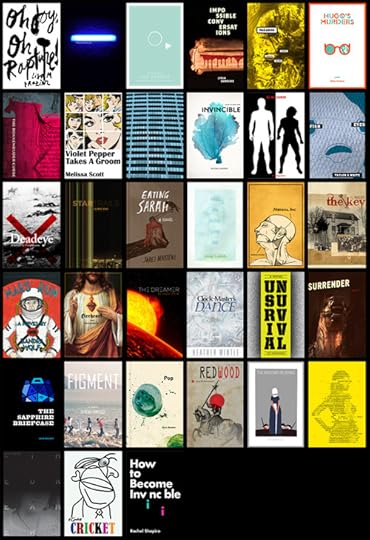
We’ve got some great stats for you Wrimos as you settle into the holidays. Participants came from all over, and we featured covers for participants in the following places:
Poland
Latvia
Estonia
Australia
Japan
Portugal
UK
Canada
USA
We have had requests for more YWP writers to be featured in the project, so this year, a total of 7 young writers received covers!
The 2012 genre breakdown looked a little like this:
Fantasy - 2
Literary/Mainstream Fiction - 4
Science Fiction - 7
Young Adult - 4
Mystery/Suspense/Thriller - 5
Adventure - 1
Humor/Satire - 2
Romance - 2
Horror - 2
Chick Lit - 1
And finally we want to extend a huge thank you to the designers who donated their time and creativity to making covers for our authors. Thank you to:
James Victore
Mark Kingsley
Travis Ladue
Alex Isley
Santiago Carrasquilla
Trevor Rogers
Alberto Rigau
Debbie Millman
Sarah Ciston
Matthew Muñoz
Josh Silverman
Solomon Wong
Tanner Woodford
Bryony Gomez-Palacio
Matteo Bologna
Andrew Twigg
Mark Dudlik
Tracy Moore Clay
Amanda Woodford
Jennifer Morla
Cary M. King
Christine Mau
Brett McFadden
Bill Klingensmith
Andrew Gibbs
Tim Belonax
Bob Aufuldish
Geoff McFetridge
Christopher Simmons
Eric Heiman
Robynne Raye
Alan Dye
In case you missed a few covers, definitely take some time to check out the tag! We were honored to be able to showcase a group of talented authors and daring designers. And don’t forget to check back with the forums for next year if you want to nominate a nano novel for 30 Covers, 30 Days 2013! Did you have a favorite cover this year?
December 12, 2012
The Impossible Infomercial

We have accomplished one impossible thing this month. We have dared to write with the intensity and passion reserved for artists, inventors, and the movers-and-shakers of the world.
But why stop there? Like one of those annoying infomercials that tries to sell you a spring-loaded spatula after you’ve already bought three cast-iron pans and Tupperware for tomatoes in the shape of (big surprise) a tomato, I would like to sell you the idea of attempting one “impossible” thing every month of this year.
As many of you have already learned from this month’s challenge, it’s not all about winning. It’s about discovering that you have fire in your veins. It’s about realizing that you are the hero in your own story. Every hero needs a next adventure. What will be your next “impossible” challenge?
Here are a few samples from my own list:
Learn to fire spin (In case you haven’t already seen it, I make a fool of myself in this recent video “Now that NaNo is over…”).
Take dance classes that will teach my right foot that it is not a left foot. Learn that it’s okay for guys to lead sometimes.
Become a Thai chef extraordinaire. 30 days and 30 recipes to increase my internal spice-o-meter.
Revise my NaNo novel into a polished second draft.
Inspire others through a fundraising event. (I’ve been told that if you are sick of all your petty problems in life, maybe you need to chose a bigger problem.)
As you can see, most of my list is unrelated to writing. Besides unlocking your writing potential, I believe that NaNoWriMo unlocks your potential to accomplish the impossible in every aspect of your life. I believe this because of the incredible testimonials that thousands of Wrimos send to OLL Headquarters. One of my first tasks as an intern was to review these testimonials and select a few for our website. What an impossible task in of itself! These testimonials spell out heroic tales running the whole gamut of accomplishments. I wish I could have chosen more to post here, but y’all are just too inspiring.
Now, I can tell that you are about to say yes to the spring-loaded spatula. Wrimos, I dare you to try one new challenging NaNo-style adventure next month. What will be your impossible task for the month of January?
— Andrea
Photo by Flickr user rishibando.
Chris Baty's Blog
- Chris Baty's profile
- 63 followers



